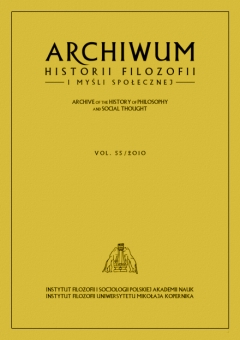Obrona Sokratesa przed krytyką Ajdukiewicza
The Defense of Socrates against K. Ajdukiewicz’s Criticism
Author(s): Adam OlechSubject(s): Logic, Ethics / Practical Philosophy
Published by: Instytut Filozofii i Socjologii Polskiej Akademii Nauk
Keywords: Socrates; Ajdukiewicz; virtue; ethical intellectualism; justification; nóesis; phrόnesis;
Summary/Abstract: The author of this article puts forward two aims: the main one and the collateral one. The main aim is to remind not enough known inference which is to justify the famous thesis of Socrates named “ethical intellectualism”. This thesis claims the sufficient condition to be moral good is to know what is good. That inference is mentioned in K. Ajdukiewicz’s Zarys logiki (The Outline of Logic) but it is inserted in this handbook as the example of inference which is saddled the error of equivocation. If that inference was erroneous indeed than it would fulfill the necessary condition to be the conclusive subjective convinced inference. The author formalizes the inference and he makes it in two languages: in the language of sentential calculus and in the language of predicate calculus. Afterwards he proves the obtained inference schemata are valid. The objection of Ajdukiewicz is caused by – as he claims – two meanings of expression “good” in the analyzing inference: “utilitarian good, that is useful to somebody” and “moral good”. If it really was like this, then the objection of error of equivocation (that is the objection of the formal error) would be well founded. However the extensions of conceptions: “moral good” and “useful to somebody” are – in the case of Socrates’ views–logical equivalent because when Socrates was speaking about usefulness he always meant usefulness only to the soul. The collateral aim of this article is to call in question the rightness of the name “ethical intellectualism”. In the author’s opinion, it would be more suitable to name the famous Socrates’ thesis as “ethical rationalism” because not intellect, but reason – in its phronetical function and not in its the noethical one – causes that we are able to choose what is good, and we are faithful to our choice. Such attitude is named “virtue”, in Latin – virtus, in Greek – areté.
Journal: Archiwum Historii Filozofii i Myśli Społecznej
- Issue Year: 55/2010
- Issue No: 55
- Page Range: 37-49
- Page Count: 13
- Language: Polish

